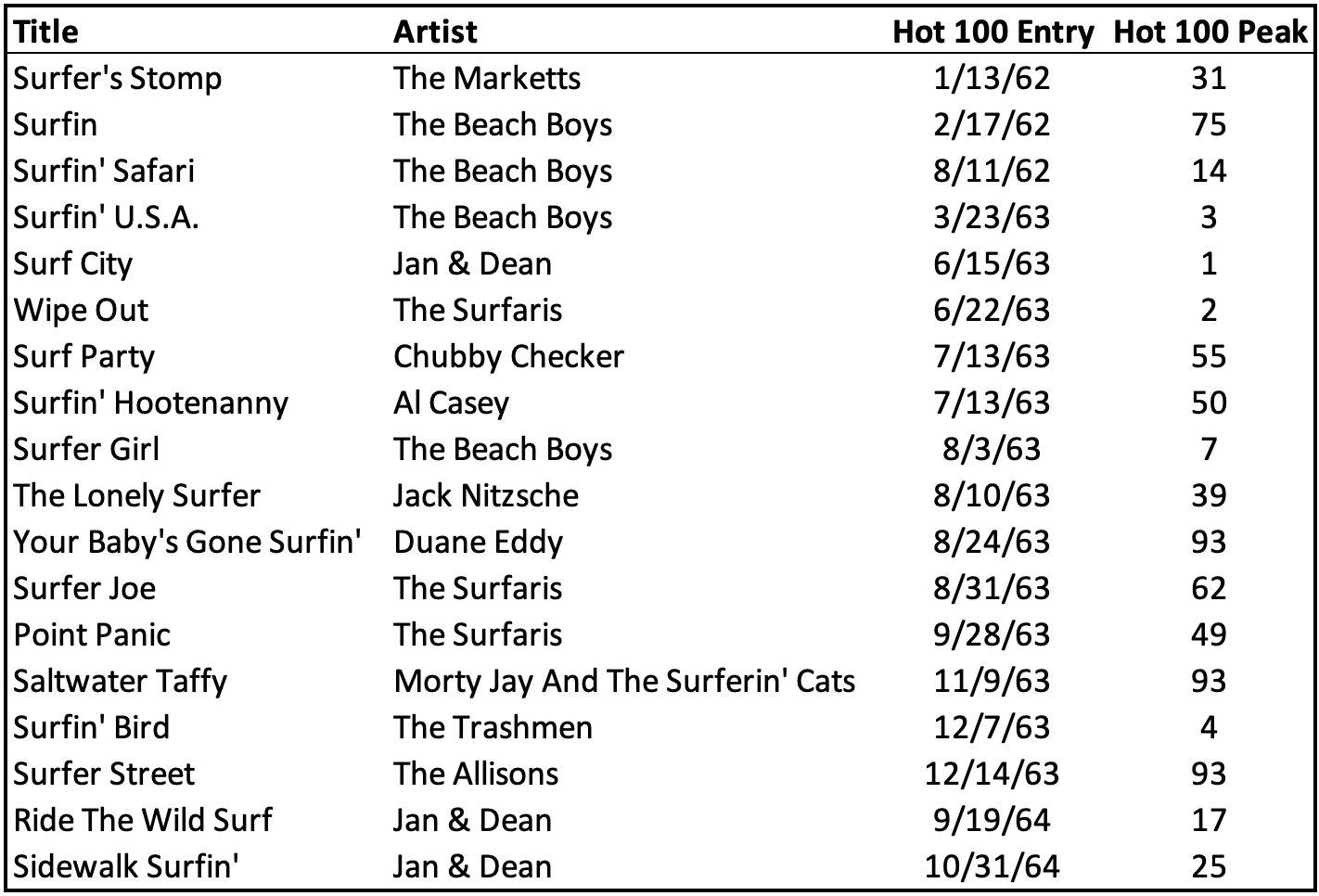The Day The Genre Died
Song titles are an unexpected way to uncover when certain styles lose their culture hegemony.
Over the last 60 years, western popular music has been focused on lyrical music. Sure, there have been some instrumental songs to achieve cultural ubiquity, but those are few and far between. Because of our preponderance with lyrics, I realized that you can track the rise and fall of certain musical movements just by looking at song titles, no knowledge of the music itself required. Today, I want to talk about two of those movements.
Let’s Go Surfin’ Down to the Disco
The Beach Boys are survivors. I don’t mean that in the corporeal sense. I mean that in the musical sense. As their name suggests, The Beach Boys grew in popularity playing music about the beach. The names of most of their first ten songs to crack the Billboard Hot 100 are a good illustration of this.
“Surfin'”
“Surfin’ Safari”
“409”
“Ten Little Indians”
“Surfin’ USA”
“Shot Down”
“Surfer Girl”
“Little Deuce Coupe”
“Be True to Your School”
“In My Room”
4 of those first 10 hits directly mention surfing in the title. That makes sense. The Beach Boys came up in California’s surf rock scene. Surf rock grew out of instrumental rock that was popular in the 1950s; it’s sound characterized by a fast tempo and reverb-soaked guitar that emulated the sound of waves. Dick Dale’s “Miserlou” is arguably the quintessential instrumental surf rock song.
The Beach Boys’ strain of surf rock is just as rocking as Dale’s but is less focused on a wet guitar and more focused on stacked vocals singing about the California coast. If you go back and look at the names of The Beach Boys’ first ten hits again, you’ll notice something else, though. Two mention cars in their titles: “409” and “Little Deuce Coupe”.
These songs were part of a surf sub-genre known as hot rod rock. Hot rod rock shared many similarities with vocal surf rock, except it traded riding the surf for cruising the road. A few weeks ago, I interviewed Carol Connors, who wrote “Hey Little Cobra”, one of the biggest songs of the hot rod craze.
Let’s get back to my original point, though. Why are The Beach Boys survivors? Nearly every other surf rock act drifted into obscurity. The Beach Boys did not. By the end of the 1960s, the only vestige of their surfing origin was their name.
What’s interesting is that you can chart the rise and fall of surf rock without knowing much about its sonic characteristics. You just have to look for Hot 100 hits with “surf” in the song title or artist name.
Using this methodology, you miss out on some surf classics - like Dick Dale’s “Let’s Go Trippin'” and the Chantay’s “Pipeline” - but you generally see how brief and intense the popularity of the style was.
Nearly every surf rock hit occurred between 1962 and 1964 with the genre reaching its commercial peak in June 1963 on the back of Jan & Dean’s number one hit “Surf City”. Though the style was influential on some strains of punk, it was all but dead by 1965. The Beach Boys were survivors for making popular music beyond that year.
As noted, you can use this methodology to track the rise and fall of other genres too. All you need to know is what lingo to look for. I’ll demonstrate this with disco.
Keep reading with a 7-day free trial
Subscribe to Can't Get Much Higher to keep reading this post and get 7 days of free access to the full post archives.



